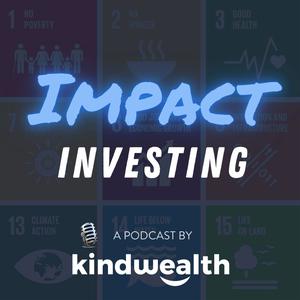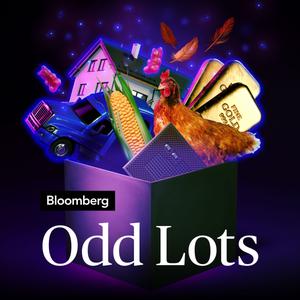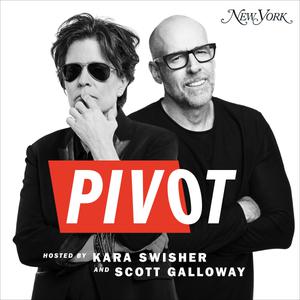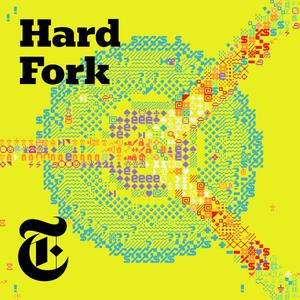
The Impact Investing Podcast
David O'Leary
Get smarter about impact investing by joining us for a series of conversations with thought leaders and changemakers from all walks of life who are using for-profit approaches in surprising and creative ways to drive social and environmental impact. Sign up at www.impactinvesting.how for a ton of free resources to help you up your impact game.
- 1 hour 1 minute49 - Building the field of regenerative media
Modern media is both wonderful and scary. It represents both the best of what people have to offer and the worst. It can include beautiful works of art by independent artists that tell stories to lift the human spirit and pass along cultural lessons and values or, as is so often the case today, is a mindless clickbait article or listicle about “10 celebrities who don’t wash their hair every day.“ That’s because modern media content is increasingly being determined by finely-tuned algorithms optimizing for clicks, engagement, and ultimately profitability, rather than any higher purpose.
Meanwhile, an increasing number of studies are demonstrating strong links between our consumption of digital and social media with an increased risk for depression, anxiety, loneliness, self-harm, and even suicidal thoughts. Continuing to allow companies to A/B test on us at scale for the sole purpose of optimizing their profitability, without regard for the toll it takes on our physical and emotional well-being, is a recipe for disaster.
Enter today’s guest Charlene SanJenko, founder of reGEN Media. This 100% Indigenous-owned and female-led media partnerships organization matches progressive impact investors with purpose-driven brand advertising dollars to fund transformative media projects that deliver both social and financial returns. Charlene is a national marketing manager, competitive athlete, digital media arts professional, and Indigenous storyteller.
In this episode, we discuss Charlene’s journey to launching reGEN Media, the problems she sees with modern media, her vision for the field of impact media and reGEN in particular, and examples of indigenous-led media projects she has begun supporting, including her own documentary about her journey to reconnect with her Indigenous roots as an adult adoptee. And be sure to stay tuned to the very end when Charlene shares more about the opportunities for how Brands and impact investors can support these amazing media projects.
Resources from this episode:
- reGEN Media’s website and LinkedIn page.
- Charlene’s LinkedIn Profile and Twitter page.
16 January 2023, 11:51 am - 1 hour 4 minutes48 - Addressing climate change & housing affordability through real estate development
Real estate as an asset class has had an absolutely remarkably run since the 1980’s when we entered a several-decade period of economic prosperity, stable inflation, and declining interest rates. Add to that, more than a decade of quantitative easing that continued to ensure cheap financing was available for consumers and homebuyers alike.
But as with every good story, it eventually must come to an end, as it has for real estate and the economy more generally in 2022. As inflation has reared its head, we’ve been left rising interest rates on top of high prices for goods and real estate, thereby dramatically straining housing affordability.
Enter today’s guest, Mazyar Mortavazi, President & CEO of TAS Impact, an unconventional impact company that uses real estate as a tool to tackle climate change, broaden affordability and equity, and build social capital to create neighbourhoods– and ultimately cities – where people thrive and belong. TAS Impact is a Certified B Corporation, a signatory to PRI and a member of the Global Impact Investing Network (GIIN), TAS pursues opportunities that create value for investors and generate measurable social and environmental impact.
During this episode, Mazyar and I discuss the current state of the real estate market and how we got into the affordability predicament we’re in, the institutionalization of residential real estate investing, the ESG and impact issues with conventional real estate development, new investment models addressing housing affordability, TAS Impact’s impact measurement framework, and the importance of inviting communities into the property development process. And be sure to stay tuned to the very end when Mazyar discusses where he sees the real estate industry headed in the next decade.
Resources from this episode:
Resources from the episode announcements:
- Check out Criterion Institute’s new podcast
- Discussion of Employee Ownership Trusts
17 November 2022, 9:36 pm - 1 hour 5 minutes47 - Transforming our unsustainable and inhumane food systems
Climate change is widely recognized as an existential threat to humanity. Chief among the contributors to climate change is our food systems. The advent of modern industrial farming brought with it a sharp increase in our ability to feed the planet. Yet this industrialization has been so rapid and so extreme that we’re now recognizing how unhealthy and unsustainable our practices have become.
Despite these advances, the system will crack under the pressure of our expected population growth (the UN predicts the global population to hit 10 billion by 2050). This is because animal agriculture is a wildly inefficient food source. The time and resources it takes to provide land, food, and water produces far fewer calories for consumption than the investment required to simply grow plants for us to eat.
Recently though we’ve seen an explosion of demand for healthier and more sustainable food choices along with a flourishing of innovation. Enter today’s guest, Elysabeth Alfano, Founder & CEO of VegTech Invest; provider of the world’s first pure-play ETF investing in plant-based innovation. Launched in Dec 2021, the VegTech Plant-Based Innovation & Climate ETF (ticker: EATV) invests in “a portfolio of high growth global equities in a pure-play plant-based innovation and technology category. VegTech™ companies are those that are innovating with plants and plant-derived ingredients to create animal-free products for sustainable consumption.”
During this episode, Elysabeth and I have a wide-ranging conversation on all things related to our food systems and the innovation we’re seeing in plant-based foods. Our conversation runs the gamut from discussing the size and scope of the problem with industrialized factory farming to more sustainable alternatives such as plant-based burgers like Beyond Meat, popular non-dairy alternatives like Oatmilk, advances in cultured (aka lab-grown) meat and cheese, and all sorts of other fascinating innovations. And be sure to stay tuned to the very end when we talk about how the VegTech ETF works and what companies the fund is investing in now.
Resources from this episode:
- Elysabeth’s Twitter and LinkedIn
- VegTech Invest’s ETF website
- Violife Parmesan Style plant-based cheese
- The Oatmilk and Oatbutter Dave loves.
13 October 2022, 10:13 pm - 13 minutes 16 seconds46 - Why assets managers should be managing the risk of Gender-Based Violence
Gender lens investing is a field that is far more robust and complex than most people realize. Often gender considerations are reduced to a check-box exercise where investors count the number of women being served, women-led businesses being financed, or women sitting on boards. More ambitious gender lens investors may expand the scope of their analysis to consider issues such as pay equity, parental leave policy for workers, and forced arbitration.
Yet even the most ambitious gender-lens investors do not think much about the diverse range of factors that can affect gender equality and social inclusion across the globe, not just a given company, project, or industry. Most often this analysis is considered too complex and the gathering of high-quality, standardized data, far too onerous. That’s because the range of issues on a global scale is mind-bending and covers disparate areas such as financial inclusion, unpaid care work, land & property ownership rights, education & literacy rates, nutrition & food security, sexual & reproductive health rights, and the list goes on. In short, there isn’t an area of our global social fabric that gender equality doesn’t touch.
Enter today’s guest, Jessica Menon, who is solving this challenge as Founder & CEO of Equilo. Jessica is a gender equality and social inclusion (GESI) specialist with 20 years of experience conducting gender analyses, crafting gender action plans, managing organizational change management with a gender lens, and implementing systems-level change to advance GESI globally. She has experience working across development, humanitarian, finance, and private sectors in a wide range of industries. She also holds a Master of Public Policy from the Georgetown Public Policy Institute.
During this episode Jessica and I discuss Equilo’s work bringing together data, analytics, and tools to inform better gender-transformative decision-making across government, non-profits, and for-profit businesses. We discuss in detail two of Equilo’s tools, the GESI Contextual Analysis, and the Gender-Based Violence (GBV) Risk Score, the methodology underpinning them, the challenges around data collection and comparability, and some of the surprising results of how various countries score on GBV Risk, and how investors should interpret and integrate this data. And be sure to stay tuned to the very end where Jessica discusses the exciting new predictive modelling work they are doing now.
Resources mentioned during the episode:
- Equilo website (where you can sign up for the GBV Risk Score and GESI analysis for free)
- GESI Contextual Analysis
- GBV Risk Score
- Jessica’s LinkedIn Profile
- UNICEF and Criterion Institute
- Episode 30 of the Impact Investing Podcast, A deep dive into gender lens investing with a true OG of the movement, with Joy Anderson
- Episode 33 of the Impact Investing Podcast, Challenging the Nobel-prize-winning theory that stands in the way of impact investing with Jon Lukomnik
- Open positions/opportunities to work with Equilo
21 June 2022, 4:00 am - 13 minutes 58 seconds45 - Investing for systemic change in a world of Web3
In an era already notable for remarkable technological innovation, we are approaching a precipice that could potentially make the last 30 years of progress seem quaint by comparison. The dawn and convergence of artificial intelligence, genome sequencing, robotics, energy storage, and the blockchain threaten to fundamentally disrupt the status quo as we know it.
The advent of the blockchain, for instance, has led to a paradigm shift - known as Web3. This paradigm shift is seeing a move away from the closed protocol that has dominated software development over the past 20 years — where the Twitter's, Facebook's, and Google's of the world own their user data and collect the lion's share of the economic value — and moving to a world of open sourced development where creators and communities share the economics and users own their data.
Already terms like DeFi (Decentralized Finance), DAOs (Decentralized Autonomous Organizations), and NFTs (Non-Fungible Tokens) are entering the common vernacular, even if many of us still don't quite understand them. At their best, innovations like this are allowing people to work collaboratively in ways that allow communities to form, share ownership, establish good governance, and operate transparently. But already there are those who worry that the potential of web3 is being co-opted by big business.
Enter today's guest, Michael Lewkowitz, Co-Founder and General Partner at Possibilian Ventures; a pre-seed / seed investor in companies building a better future across the transition and cooperation economies. What makes Possibilian particularly interesting is that it is focused on supporting founders who are leveraging these converging technological breakthroughs to unlock true systems change to address the two biggest existential threats we face: climate change and inequality.
During the episode, Michael and I discuss Possibilian's unique thesis, five areas of transition we're currently experiencing, the definition of terms like Web3, DeFi, NFTs, and DAOs, why Web3 could massively disrupt the status quo, and examples of investments Possibilian is making in companies leveraging these technologies for systemic change. And be sure to stay tuned to the very end where Michael shares his outlook for what possibilities these new technologies could enable over the next decade.
Resources from this episode:
Possibilian Ventures Website
Possibilian's Perspective on Venture & Transformation
Klima DAO
Constitution DAOs bid to buy the US Constitution
Episode #542 of the Tim Ferris Podcast discussing Web 3 with Chris Dixon and Naval Ravikant
Chris Dixon's Twitter
Naval Ravikant's Twitter
Andreesen Horowitz Web3 Learning Resources
- From the Episode Announcements:
i2 Impact Investing (Columbia)
21 May 2022, 9:06 pm - 26 minutes 10 seconds44 - The Rhodes scholar who is democratizing access to impact investments in Africa
When you consider that the traditional investment industry can be traced as far back as ancient Mesopotamia in 1700 BCE, the field of impact investing is a baby. Indeed the term itself wasn't coined until 2007. Since then the industry has been evolving and growing rapidly.
Yet much of that growth has been occurring among a relatively small group of investors and concentrated heavily in a relatively small number of markets. Even today most of the world's aspiring entrepreneurs do not have access to the capital they need to grow their small businesses. And the ordinary investors who might like to provide that capital are barred from doing so due to investor protection regulations.
Herein lies one of the most significant criticisms of impact investing. Much like the traditional investment world, the impact investment industry is still dominated by a small number of investors and institutions supplying capital to a select group of entrepreneurs.
Enter today's guest, Sarah Burns, Founder, and CEO of Nia Crowdfund. Nia is an online investment platform serving up opportunities to make impact investments in small businesses across Africa. Nia aims to address the missing middle of finance (a problem we’ve discussed at length on this podcast) to provide between $100,000 and $1M of capital to early stages businesses. What further distinguishes Nia Crowdfund is that not only are they supplying this critical early-stage financing but they are focused on allowing ordinary investors to also participate in supplying that capital.
During this episode, Sarah and I discuss her fascinating background of volunteering, researching, and working through the developing world, her doctoral thesis on impact investing as a Rhodes Scholar at Oxford, and now her work founding Nia Crowdfund to address the missing middle of finance while also democratizing access to impact investing.
Through the conversation, we discuss why the missing middle of finance is a challenge, the importance of democratizing access to impact investing, the well-intended regulations that exclude retail investors from it, and how Nia Crowdfund was designed to address the problems Sarah encountered during her work advising an ultra-high-net-worth impact investor. And be sure to stay tuned to the very end where Sarah and I discuss whether impact measurement is beneficial or harmful to drive real impact.
Resources from this episode:
- Nia website
- Learn about and register to join monthly live impact investment pitch events hosted by Nia.
- Sarah Burns LinkedIn Profile
- Paul Collier's The Bottom Billion
- KIVA Microlending website
*** We've been nominated for the Quill Podcast Awards in two categories, Best Business Podcast and Best Finance Podcast. We would appreciate your support, vote for us here!
1 March 2022, 8:37 pm - 11 minutes 40 seconds43 - Putting humanity back into Economics
For all the good that impact investors claim to be doing, it behooves us to consider what harm we might be causing in the process and whether, ultimately, we're doing more damage than good. After all, impact investing is still investing. It exists within the current framework of free-market Capitalism. And as the deep fractures in that system have been laid bare, it only makes sense to ask ourselves what systemic changes are required to bring about true and lasting equality.And while many people are beginning to discuss how Capitalism can be improved, or even whether it is salvageable, today’s guest is exploring even more fundamental questions about our understanding of economics. After all, it shouldn’t surprise us when our financial systems fail us if those systems are built off a flawed understanding of economics.Enter today’s guest, thought-leader, advisor, and author, Denise Hearn. Denise joins us today to discuss her new blog Embodied Economics, which is, in her own words, an exploration of “economic paradigms and financial systems through, Nature, Body, Power, Care, and Interconnectedness”.In Denise’s first blog post, she asks us to consider “What is life? What is economic value?” On the surface, these are easy questions to answer yet the better we understand these terms, the more difficult they become to define. Denise argues that economics for too long has operated in the theoretical realm, divorcing itself from the realities of life. If economics is to serve us better, it must be understood in the following context:(once again in Denise’s words) “to be human is to be a living, embodied person, embedded in nature and a complex tapestry of relationships.”In this episode, Denise and I discuss the intellectual, philosophical, and spiritual inquiry that is Embodied Economics. We discuss how we can better understand economic value, what she calls the Forgotten Five of Economics (body, nature, care, power, and interconnectedness), a simple way to grow global GDP by 10% overnight, her book The Myth of Capitalism, and her work on anti-competitiveness. And be sure to stay tuned to the very end when Denise and I discuss her thoughts on how she and each of us can affect meaningful change.Resources from this episode:
- Denise’s website
- Embodied Economics blog (you should definitely subscribe!)
- Denise’s book The Myth of Capitalism
- Denise’s LinkedIn Profile
18 February 2022, 12:49 am - 58 minutes 59 seconds42 - Leveraging technology and a human-centred focus to better manage crises response
While some might argue that the world is a much better place than it was thousands, hundreds of years, or even decades ago, it's hard not to feel like the world’s problems are greater than ever. In the past five years alone we've experienced a string of heart-wrenching global crises that have come fast and furious.
Haiti, India, Bangladesh, Indonesia, Puerto Rico, and the Dominican Republic have all been hit by terrible natural disasters. We've seen the Syrian civil war, Venezuelan and Afghanistan refugee crises', and the Rohingya genocide to name a few. Exacerbating these catastrophes is the COVID-19 global pandemic. So despite our progress, it often feels as if the world's needs are greater than ever and we have a long way to go before approaching anything resembling true equality.
Enter today's guest, Natasha Freidus, Co-Founder and CEO of NeedsList; a Public Benefit Corporation creating human-centred solutions for communities displaced by climate change, conflict, and poverty worldwide. The idea for NeedsList was sparked in 2015 at the height of the refugee crisis in Europe when Tasha was in France trying to help local Syrian refugee families, and her co-founder Amanda Levinson was in Philadelphia trying to figure out how more quickly and effectively gets goods and services across the globe to those in need.
The challenge is that the needs of people in crises are overwhelming and constantly changing, and it is difficult to keep track of what is needed and which organizations have the products, services, or expertise to meet those needs. In short, matching supply and demand has been incredibly difficult. That’s when Tasha decided to hack an online wedding registry as a way to solve the problem; in the process, the idea for NeedsList was born.
During this episode, Tasha and I discuss how and why it's so difficult to match supply from well-meaning groups and organizations with the needs of people on the ground who are suffering through crises. Our conversation spans the gamut from the original problem Tasha experienced first hand, the journey to founding and funding NeedsList, the evolving nature of global crises over the past decade, and the challenges around impact measurement & management. And be sure to stay tuned to the very end when Tasha discusses the opportunities she’s seeing to use machine learning and AI to gain new insights into the nature and causes of global crises so that we can address the problems before they happen.
Resources from this episode:
- NeedsList website: www.needslist.co
- NeedsList Twitter
- NeedsList Facebook
- NeedsList LinkedIn
- Natasha’s LinkedIn Profile
7 January 2022, 9:38 pm - 14 minutes 19 seconds41 - Transforming idle church properties into thriving communities of sustainable impact
Churches across the globe are in crisis. The arrival of COVID-19 served to dramatically accelerate a decades-long systemic decline in church attendance as the expectations and preferences of congregants have changed across generations. Falling church attendance has meant declining revenue and mounting financial pressure to maintain expensive real estate and buildings that sit increasingly idle. Ultimately these churches may face closure and even demolition. In Canada, it is estimated that nearly one in three churches is on track to close in the next decade.
And while we live in an increasingly secular society, as today's guest will articulate, churches represent an incredibly important social infrastructure that a vast number of social programs rely upon. In Toronto alone, over 100 non-profit organizations operate from church buildings or land. Losing these churches (which are often rented out at below-market rates to non-profits) would be catastrophic for many secular social purpose organizations and the vulnerable communities they serve.
Enter today's guest, Graham Singh, Founder & CEO of Trinity Centres Foundation, who joins us today to talk about his innovative work using impact investing to finance the transformation of idle church properties into thriving places of sustainable community impact. Over the past 15 years, Graham has led four historic building and community renewal projects in the United Kingdom and Canada. Graham is an ordained minister in the Anglican Church and has a long line of academic credentials that include a Master's from the London School of Economics, a Bachelor of Ministry from the University of Cambridge, and a BA in political science from Huron University.
During this episode, Graham and I discuss the crisis that the church in Canada is facing, the role churches play as important social infrastructure, the role of blended finance in solving the financial challenges churches face, and the types of investors and organizations that are suitable partners in this work. And be sure to stay tuned to the very end where we discuss the importance of the church in placemaking; the process of co-creating quality places that people want to live, work, play, and learn in.
Resources from this episode:
- Graham's LinkedIn profile
- Trinity Centres Foundation (TCF) website
- Where you can donate to support the work of Trinity Centres Foundation.
18 December 2021, 3:06 am - 31 minutes 50 seconds40 - The charity that gave birth to a $300M global impact asset manager
Investing in emerging markets isn't easy. Investing in emerging markets when you want to make a positive social and environmental impact presents even more challenges. For instance, raising capital is more challenging because you have to overcome both the typical investor belief that positive impact will come at a cost to returns and the tendency to write off unfamiliar markets as far too risky.
Today's guest co-founded an asset management firm that has successfully navigated these challenges on its path to growing its asset base to over $300M USD. Serge LeVert-Chiasson is Managing Director of Impact & COO at Sarona Asset Management; an asset manager investing in private equity & private debt in frontier and emerging markets around the world.
What's especially interesting is that Sarona was born out of a relatively small, but highly respected charitable organization known as MEDA (Mennonite Economic Development Associates); which itself got its start in 1953 as a social enterprise when 7 North American Mennonite business people began running a dairy farm with Ukrainian Mennonite refugees in Paraguay who had escaped the 2nd world war.
During this episode of the podcast, Serge and I discuss Sarona's unique history and how that shapes its culture to this day; the way Sarona invests in and alongside financial intermediaries in emerging & frontier markets; its approach to impact measurement & management as a fund of funds, the role that faith plays in many communities across the globe, examples of the types of direct and indirect investments that Sarona makes, and Serge's involvement in CAFIID (Canada Forum for Impact Investment & Development). And be sure to stay tuned to the very end when Serge shares his thoughts for what is necessary for unlocking more impact investment dollars into emerging and frontier markets.
Resources:
23 November 2021, 8:40 am - 1 hour 34 minutes39 - Exploring new possibilities by blending philanthropy and impact investing
While the field of social finance and impact investing has blossomed in recent years, most people still tend to think about donating or impact investing as discrete activities with discrete approaches or strategies.
Say the word "philanthropy" and most people think of oversized cheques at black-tie galas where your donations are spent by organizations on goods, services, and programs. Say the words "impact investing" and most people think of rigorous due diligence where your money can be leveraged far more through investment and reinvestment.
But what would happen if we combined the two approaches? That's what today's guest is here to discuss. Farahnaz Karim is the Founder & CEO of Insaan Group; a non-profit raising donations which the organization uses to invest in innovative businesses and solutions for the poor, a term they call "catalytic philanthropy".
Farahnaz is a social entreprenur, political scientist, and humanist. She has worked with the OSCE, the United Nations, the World Bank and non-profits across a wide range of developing countries across multiple continents. Farahnaz was previously a teaching fellow at Harvard University and a faculty member at Zayed University in Dubai lecturing on global history and humanities. She holds an MPA from Harvard, a Diplôme d’Etudes Supérieures from the Graduate Institute of International and Development Studies (Switzerland) and a Bachelor of Arts from McGill University (Canada). And if all that wasn't enough she is currently a doctoral candidate at the University of Exeter (UK).
During this episode, we discuss Insaan's unique approach, the contexts in which it is most effective, how Insaan makes investment decisions, the unique ways they engage donors through the process, examples of entrepreneurs they've invested in, and their current fundraising campaign. And be sure to stay tuned to the very end where we discuss how Insaan measures and manages impact.
Resources from this episode:
6 November 2021, 12:57 am - More Episodes? Get the App
Your feedback is valuable to us. Should you encounter any bugs, glitches, lack of functionality or other problems, please email us on [email protected] or join Moon.FM Telegram Group where you can talk directly to the dev team who are happy to answer any queries.
 Hidden Brain
Hidden Brain
 Odd Lots
Odd Lots
 Pivot
Pivot
 The Daily
The Daily
 Hard Fork
Hard Fork
 Stuff You Should Know
Stuff You Should Know